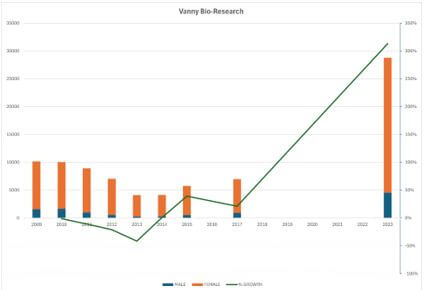International Committee Keeps Spotlight on Illegal Monkey Trade: PETA Statement
For Immediate Release:
July 19, 2024
Contact:
Tasgola Bruner 202-483-7382
Please see the following statement from PETA primate scientist Dr. Lisa Jones-Engel regarding today’s decision of the Convention on International Trade in Endangered Species of Wild Fauna and Flora (CITES) to maintain additional scrutiny of endangered monkeys exported from Cambodia, the Philippines, and Vietnam in order to determine whether the trade is legal, sustainable, and traceable:
CITES’ announcement today is the latest smackdown for Charles River Laboratories, Envigo/Inotiv, Worldwide Primates, and other companies exploiting animals in the primate-experimentation industry. PETA praises the international regulatory body for keeping a spotlight on the exports of endangered monkeys from Cambodia, the Philippines, and Vietnam, despite desperate attempts by the experimentation industry to deflect attention from their questionable practices.
PETA reviewed documents from these countries and submitted analyses raising legitimate questions regarding the reliability and validity of the countries’ claims about their success with captive breeding.
The U.S. Fish & Wildlife Service, which was present at CITES, should now follow through with the justifiable concerns they raised about the illegal trade in long-tailed macaques and the risk of the emergence of zoonotic diseases and use every means available to prevent the importation of wild-caught monkeys from these countries. Stopping the flow of tens of thousands of monkeys into the U.S. would fulfill the agency’s mandate to preserve and protect wildlife while also safeguarding research interests and public health.
CITES was examining these issues following charges of monkey trafficking against executives of a large Cambodian monkey-export company, Vanny Bio- Research, whose executives were indicted by the U.S. Department of Justice in late 2022. The company’s officials were charged with capturing monkeys from the wild and selling them with falsified CITES documents indicating that they had been bred in captivity, a violation of U.S. federal law. Following the indictments, the U.S. Fish & Wildlife Service has denied entry to U.S. labs of all monkeys from Cambodia for which the importers are unable to prove that the animals are captive-bred. There are currently more than 1000 Cambodian-origin long-tailed macaques caught up in legal limbo.

Representation of the total number of adult male and female long-tailed macaques (Macaca fascicularis) reported to CITES authorities by Vanny Bio Research. Data from 2009 through 2014 was disclosed in Annex 4 of the 2014 data reported to CITES. The Vanny farm in Pursat is identified as “Facility 3” in the 2018 Cambodian monkey farm data reported to CITES and as “Facility 6” in the 2024 report to CITES. Years with missing data were not provided to CITES. The growth rate between 2017 and 2023 is biologically impossible unless a substantial number of long-tailed macaques were added to the colony. Vanny reported that only 2,000 long-tailed macaques had been added in 2020 from outside the property.
PETA—whose motto reads, in part, that “animals are not ours to experiment on”—points out that Every Animal Is Someone and offers free Empathy Kits for people who need a lesson in kindness. For more information, please visit PETA.org or follow the group on X, Facebook, or Instagram.


